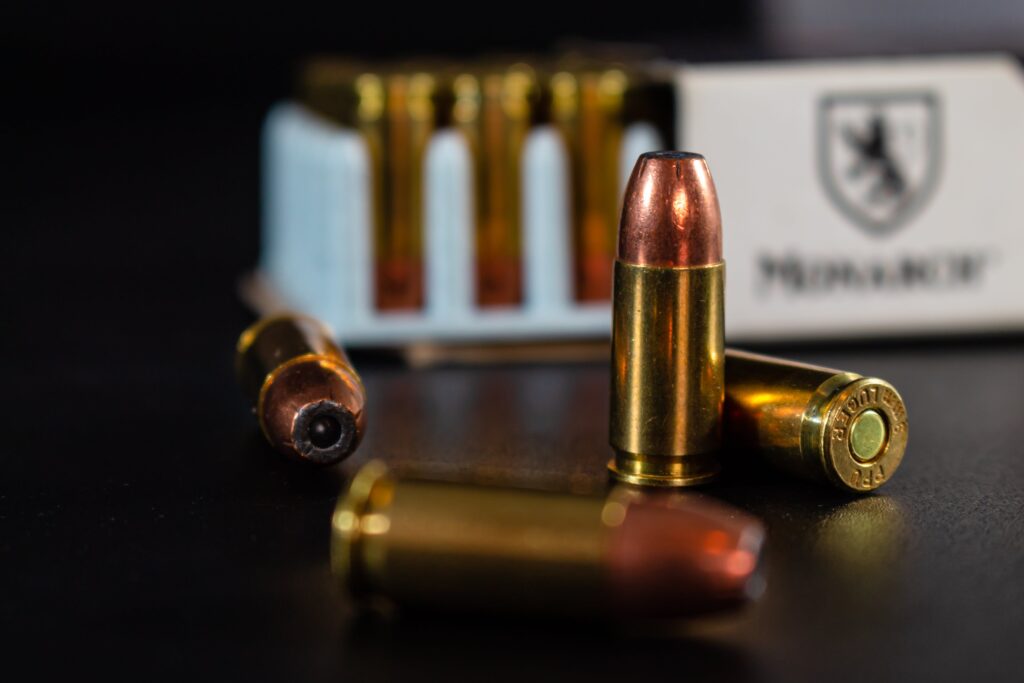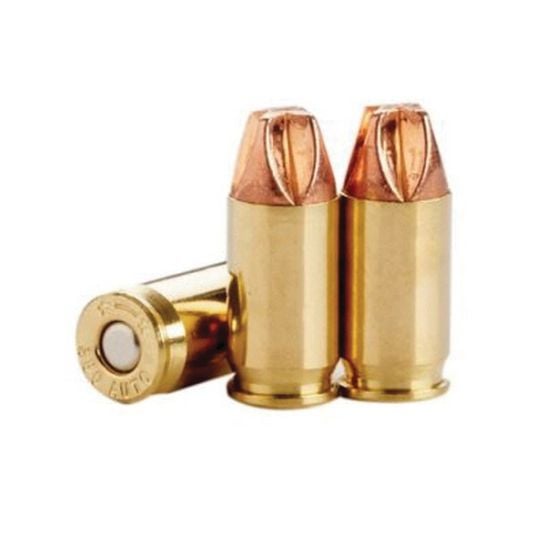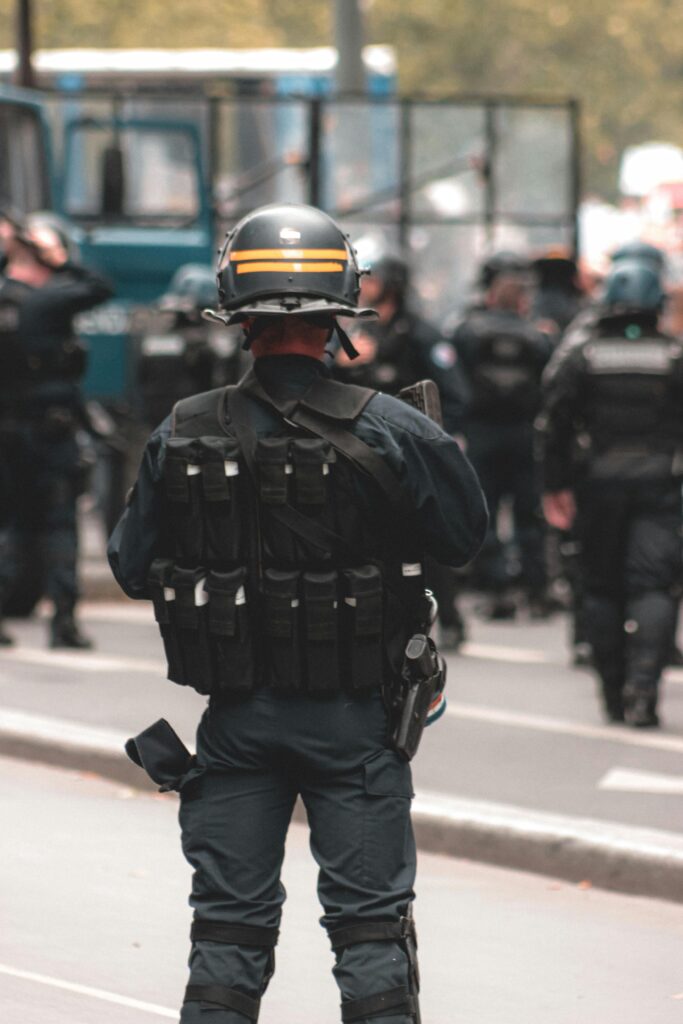
July 2nd 2024
This article contains affiliate links. If you buy through our affiliate links then we earn a small commission, and you get our promise to find you the lowest price from a wide range of dealers.
Selecting the ideal ammunition for self-defense goes hand in hand with choosing the right firearm. For those passionate about guns, grasping the finer points of defensive ammunition can lead to choices that perfectly balance stopping power, reliability, and safety.
Understanding Ammunition Basics
It’s crucial to start with a basic understanding of ammunition. Ammunition is categorized by its caliber (the bullet’s diameter) and its design. The caliber significantly impacts the ammunition’s effectiveness in self-defense scenarios. Popular choices include the 9mm, .40 S&W, .45 ACP, and .380 ACP for handguns, with 00 buckshot or slugs preferred for shotguns.
Each option has its own pros and cons in terms of stopping power, recoil, capacity, and user-friendliness.
1. 9mm Luger
The 9mm Luger is one of the most popular calibers for self-defense due to its balance of stopping power and manageable recoil.
It allows for higher magazine capacity, making it a preferred choice for many gun owners. As 9mm has taken over as the default defense round, manufacturer R&D has focused more and more on the guns & ammo.
The result is a wave of brilliantly compact guns with solid magazine capacity and ammunition that has consistently closed the gap on more powerful rounds.
- Best 9mm ammunition for sale in 2024
- 9mm Micro Compact pistols on the market.
- The best subcompact 9mm handguns.
2. .40 S&W
Offering more stopping power than the 9mm, the .40 S&W brings increased recoil. It serves as a middle ground for those seeking more punch than the 9mm but with less kick than the .45 ACP.
3. 45 ACP
The .45 ACP is renowned for its stopping power.
The trade-off is lower magazine capacity and more recoil, which can be a factor in rapid-fire scenarios.
In States with limited magazine sizes, though, you might want 8 rounds of 45 ACP rather than 10 rounds of 9mm.
- 45 ACP ammunition – For Self Defense and Target Shooting
- The Best Subcompact 45 ACP Pistols on the Market
4. .380 ACP
The .380 ACP is often used in smaller, compact handguns due to its lower recoil.
While it offers less stopping power, it can still be an effective self-defense round, At self defense distances, this has always been an effective round. And the R&D has trickled down to the 380 hollow points,
Bullet Types and Their Implications for Self-Defense
The type of bullet is a critical consideration in choosing defensive ammunition. The main types to consider are full metal jacket (FMJ), hollow point, and ballistic tip.
1. Full Metal Jacket (FMJ)
FMJ bullets are commonly used for target shooting and training.
However, they are generally not recommended for self-defense as they don’t expand and just tend to punch through the target.
They can also icepick through your adversary without stopping them. That was a common complaint in the Vietnam war with early 5.56 NATO ammo.
2. Hollow Point
Hollow point bullets are designed to expand upon impact, maximizing the damage to the target while reducing the risk of over-penetration.
This makes them an ideal choice for self-defense. Quality Hollow Points like Federal HST are seriously good in terms of terminal ballistics.

3. Fluid Transfer Monolithic
The whole market looked on with a healthy dose of side eye in the early days of FTM bullets. But not Wilson Combat has bought one of the pioneers, LeHigh Defense. Now its FTM rounds with the sharpened wadcutter approach offers a different kind of stopping power.
Try some in your handguns and you might be surprised.
4. Ballistic Tip
Ballistic tip bullets are similar to hollow points in their expansion upon impact but have a plastic tip that allows for more aerodynamic flight. These bullets tend to be more go through obstacles like windshields and heavy clothing with less deflection.
They offer both accuracy and stopping power. Hornady Critical Defense and Speer Gold Dot are both approved by most Law Enforcement Agencies in the United States, so they’re safe bets in most calibers.
5. Frangible Rounds/Ripper Bullets
These are designed to fragment on impact, creating multiple wound channels, though their effectiveness is debated
Penetration and Expansion: Balancing the Two
In defensive ammunition, the balance between penetration and expansion is critical. Effective self-defense rounds should penetrate sufficiently to reach vital organs but also expand to create a larger wound channel.
Once you have decided to fire, the only important thing from then on is to incapacitate your attacker as fast as possible. I mean it sounds selfish, but it’s true.
Over-Penetration Concerns
Over-penetration is a significant concern in self-defense scenarios, especially in urban or residential settings. The risk is that a bullet passes through the intended target and harms an innocent bystander. Of course they sometimes go clean through apartment walls and take out your neighbor.
Hollow point bullets are generally preferred for self-defense as they are designed to expand and stop within the target, reducing the risk of over-penetration.
Reliability
The reliability of ammunition is the number one priority in self-defense situations. It’s crucial to choose ammunition that feeds reliably in your specific firearm. This often requires testing different brands and types to determine what works best with your specific gun, not just a combo that should work…
Spend time at the range, experiment with different calibers and see which one suits you and your handgun the best.
Do not skimp here, because this is the gun you will trust with your life. The effectiveness and reliability of the ammunition in a life-threatening situation are way more important than a few dollars in the long run.
The Importance of Regular Practice
Regular practice with your chosen defensive ammunition is important. This not only familiarizes you with its performance and recoil, but also ensures that it feeds reliably in your firearm.
If you need to find out something weird about your guns & ammo combo, it’s best to do it at the range with nothing riding on it.
Understanding Ballistics and Ammunition Performance
A basic understanding of ballistics is helpful in choosing the right defensive ammunition. This includes knowledge of how bullet weight, velocity, and design affect performance.
Conclusion
Selecting the right defensive ammunition is a critical aspect of responsible gun ownership. It involves understanding the balance between stopping power, reliability, and safety.
Remember, the best ammunition for self-defense is the one that works reliably in your firearm and that you’re comfortable and proficient in using.


